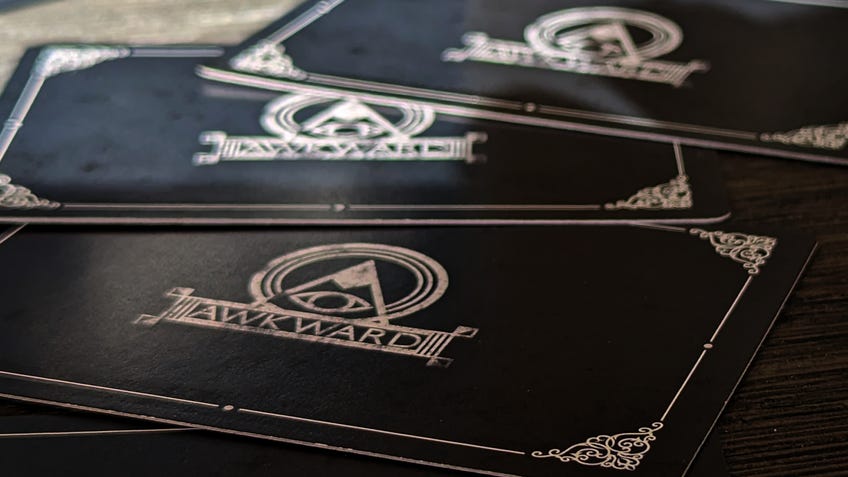An Awkward transition: How the creators of your favourite PS2 quiz game went from pixels to paper
‘I like the purity of board games; you can just really focus on creating the fun.’
Brighton games studio Snap Finger Click was born out of the ashes of developer Relentless, creator of successful PlayStation 2 quiz series Buzz. If you remember playing a game show with a peppy, quiffed host voiced by Jason Donovan and untangling a bunch of plastic buzzer controllers, you remember Buzz.
Recently released card game Awkward is Snap Finger Click’s first foray into tabletop games, but the studio is no stranger to party games. Among its catalogue of titles designed to gather friends and family in the same room is Buzz spiritual successor It’s Quiz Time, charades video game Act It Out and digital adaptations of popular game shows and board games such as Trivial Pursuit and Family Feud.
“We play a lot of board and card games, because that’s obviously a big inspiration for what we do in video games,” says Awkward designer Joanna Haslam, who previously worked on Buzz! and Family Feud, as well as Furby Boom, an app-connected evolution of the furry toy. “Our games have so much more in common with board games than they do with traditional triple-A, massive, epic [video] games.”
Awkward itself made its debut on a screen, releasing in 2018 as a digital party game with multiplayer for local players or online viewers in the vein of the influential Jackbox Party Pack series. In the game, players take turns to answer divisive questions - ranging from lighthearted prompts like whether pineapple is an acceptable pizza topping to darker, moral questions such as whether you’d save the life of a one-year-old or 18-year-old - while the rest of the group attempt to guess their response. Guessing correctly nets you points.
“[After the release of Awkward] we kept talking for months afterwards. Basically, how would this game work as a real card game that you could play with your friends?” says Snap Finger Click co-founder and development director Martijn van der Meulen. “The market for mature card games is absolutely massive. Obviously, everyone knows about Cards Against Humanity. But even things like Secret Hitler. These are proper hardcore adult games. It felt like we could do something with the Awkward video game and add something to the size of the adult part of the market.”
“A few people asked us about it,” recalls Haslam. “I do remember when we went to [video game developer conference] Develop that year. And then people were saying to us like, ‘Oh, have you thought about making a real card game?’ And we're like, ‘Yeah, you know, we thought about it, blah, blah.’”
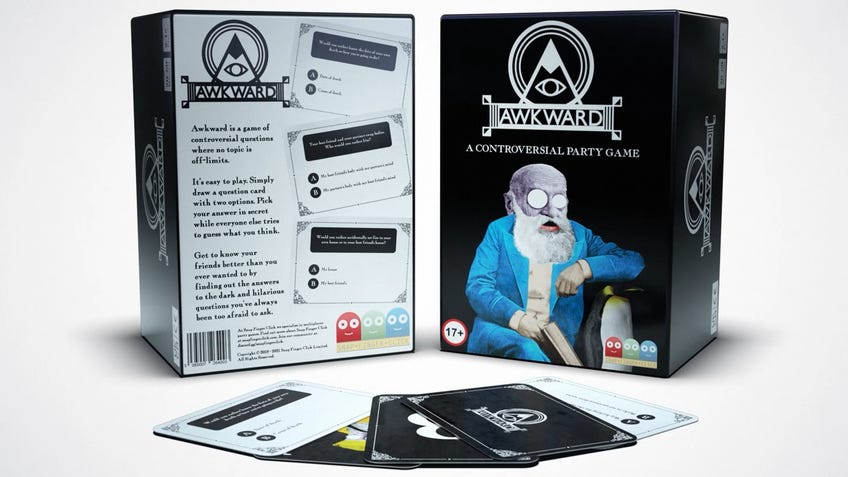
A chance opportunity to test the waters with Awkward as a physical card game would come a year later through Snap Finger Click’s involvement with WISE, the initiative supporting Women in Science and Engineering.
“We were going to their award ceremony and they asked us if we could design a table game for them because they thought it'd be fun for the guests,” Haslam says.
It felt like we could do something with the Awkward video game and add something to the size of the adult part of the games market.
Haslam picked out a handful of the video game’s most divisive questions, adding a custom prompt to spark relevant discussion around the future of women in STEM. Like the rest of the game’s questions, the idea wasn’t to have a right or wrong answer, but to get people talking. Van der Meulen knocked up some cards in PhotoShop one afternoon, before printing off the cards at a print shop around the corner.
“We honestly just thought no-one's going to even touch it or look at it,” Haslam admits. “We were there, our table didn't seem that interested in it. It's nice that we did it, whatever.
“But then we saw the photos going up from the award show, and they had lots of pictures of people playing and holding up their cards. And I saw people commenting on LinkedIn saying, ‘Thanks for introducing me to my new favourite game.’ And we were really like, ‘Okay, people actually really enjoyed it. Maybe there is something in this.’”
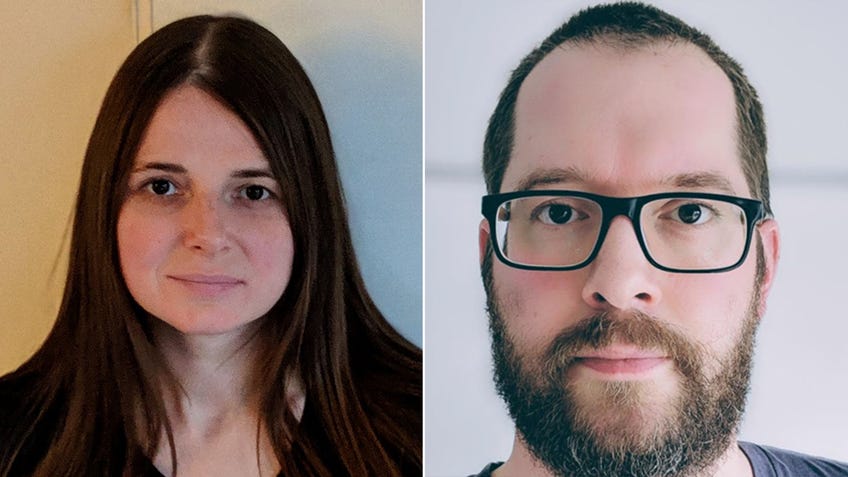
While playing another party game (“It wasn't that great,” says Haslam. “There were a lot of filler questions.”), the designers finally decided to bring Awkward to the table for real.
“We'd had a couple of wines and we were like, ‘We can do better than this!’” Haslam laughs. “The next day, it was like, ‘Was that just like a drunk conversation? Or are we actually going to do this?’ And then it was, ‘Yeah, let's do it. Let's see. Why not?’”
While the game made for WISE didn’t include a way of scoring - it was solely meant as an icebreaker, not a competition - the original video game’s scoring system, which sees players pair up to predict their partner’s answer, was too complex to work in paper. Haslam introduced points cards, handed to the players who correctly guess what the current active player will answer.
The Snap Finger Click team were well-versed in managing budgets and production timelines for a video game, but moving into manufacturing a physical set of cards came with new challenges. Haslam suggests the difference was so stark it was like “starting from nothing”.
“The budget is much less than a typical video game, but it just takes so much time to get stuff organised,” Van der Meulen compares. “More than 75% of the whole work is just talking to people. You know, coordinating stuff.”
“We didn't realise how many things we'd have to do,” Haslam says. “We knew it was going to be a big challenge for us. But I think we were also just really up for it.”
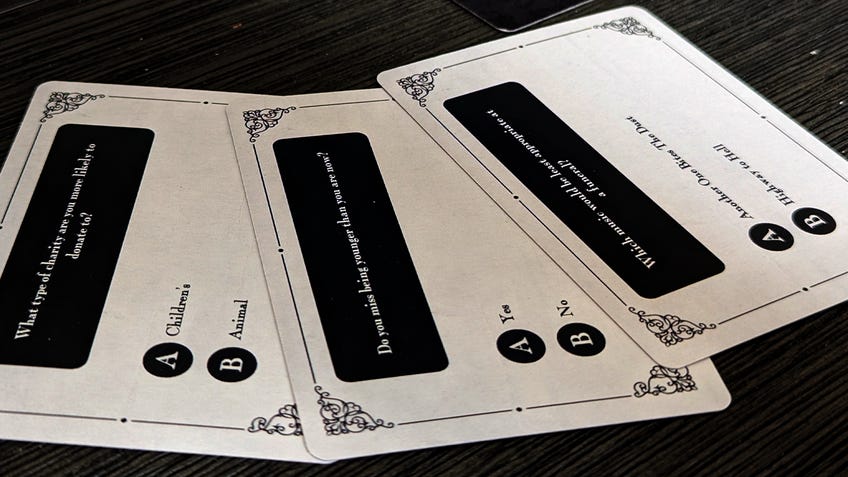
Effectively back at square one, the experienced developers started in the same way that anyone would: by Googling, asking in online board game forums and contacting dozens of manufacturers to simply get a measure of the industry’s expectations.
“What's normal? If you say 500, do these companies freak out? Or do they laugh at you because it's a tiny order? Maybe even 5,000 is just laughably low for these companies. Or maybe the other way around. Just literally no clue,” says Van der Meulen.
Most of the things that people say about what it's like to be on Kickstarter are completely true; don't underestimate how much work the amount of preparation is.
After eventually pinning down someone to make their game and refining its physical contents (including springing for laminated spill-resistant cards, like any good party game should), the team decided to crowdfund their creation via Kickstarter. Another first for the studio, using the crowdfunding giant presented yet another set of things to learn along the way.
“Most of the things that people say about what it's like to be on Kickstarter are completely true; don't underestimate how much work the amount of preparation is,” Van der Meulen stresses. “Originally, we were like, ‘Oh, we’ll get a Kickstarter page live. Maybe that's a month’s work.’ We spent like four months preparing everything.”
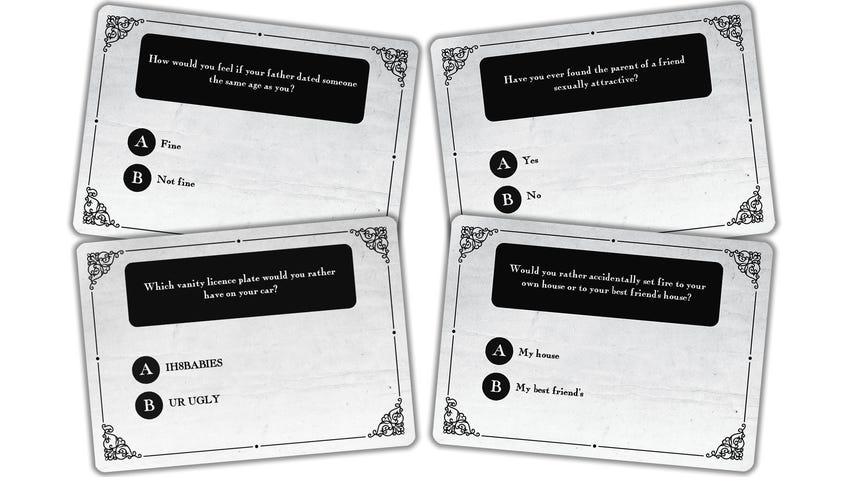
The work paid off, with Awkward’s Kickstarter campaign successfully raising over £5,000 in November 2021. Just over a year later, the finished game is in backers’ hands, as well as being available to the public via the studio’s own website. (If you’re near Brighton, there are some already well-loved copies for visitors to play in local pubs and board game cafés, too.)
Although the game is now on players’ tables, its creators continue to jump at the chance to dive into brand new waters. When we speak, they’re attempting to open discussions with John Lewis and video game retailer GAME about stocking Awkward, having just listed it on Amazon. (“Our experience is like episodes of The Apprentice: walking around with a box asking, ‘Do you want to sell [this]?’” Haslam laughs.)
“We're learning more and more every day, like how to best deal with this,” says Van der Meulen. “[Let’s] complete that journey first, then I'm like, ‘Oh, maybe we should do like a second board or card game.’”
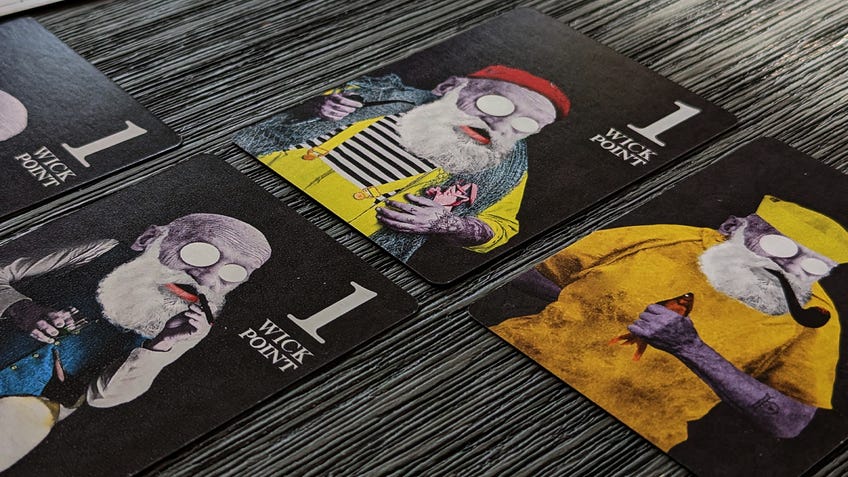
That doesn’t mean the studio is standing still in the meantime. Earlier this year, Snap Finger Click released a sequel to the original Awkward video game that introduces more variation to the core split-the-room format with a series of different minigame rounds - a direct response to players who found the first game a little one-note.
“One of the things with board games is that the audience is much more accepting of a very simplistic mechanic,” Haslam says. “One of the one bits of feedback we had on the first Awkward video game was that, for some people, it just wasn't varied enough. It was just too simple. We made it deliberately simple because we really wanted to focus on people having a conversation about the types of questions that you get, and we wanted to give people that space. But not everyone gets that. Everyone plays it in their own way.”
I do quite like the purity of board games in some ways; that you can just really focus on the bit that is creating the fun.
“For a video game, there needs to be more to it,” Van der Meulen adds. “It needs to feel like, ‘Oh, this is a pretty rich experience.’ Voiceover, all those things. Because independent of how strong the mechanic is, it's an expectation that video game players have.”
“You can do the same thing in board games and build up that whole world, lore and everything,” Haslam says. “Or you can have something that's literally just cards and text, and there's no story or anything. It's just black and white cards. You can't really do that in video games. There's a minimum sort of expectation. That's interesting. I do quite like the purity of board games in some ways; that you can just really focus on the bit that is creating the fun.”
As for the future, Haslam is keen to utilise the studio’s newfound experience to make another tabletop game again in the future.
“We often come up with little fragments of ideas that don't feel big enough to be a video game, that could work as a board game, and we just never really do anything with them. They just sit around somewhere and never see the light of day,” she says.
“I still feel like a bit of a novice when it comes to designing board games. I feel like there's a whole world out there I haven't really discovered yet. And so I feel like I need to think a lot more about it, try a few new things before I can really get to something more complicated. But I would love to do it and give it a go and see where we end up.”
